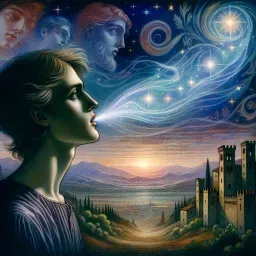”Love, which absolves no loved one from loving,
seized me so strongly with his charm that,
as you see, it does not leave me even now“

- Meaning
- The quote expresses a powerful and poignant concept about love. Francesca explains that love does not allow the beloved to avoid loving in return: an irresistible force that led her to fall hopelessly in love with Paolo Malatesta. This love, though sinful by the standards of the time, is so strong that it holds her captive even in the afterlife. The phrase explores themes such as the irresistibility of love, uncontrollable passion, and the eternity of feelings.
- Allegory
- The image presents an infernal landscape where two ethereal figures wrapped in a fierce wind represent Paolo and Francesca. The luminous, pulsating heart symbolizes the eternal love that does not abandon them, despite the suffering. The chains represent their inevitable fate, while the roses symbolize the beauty and passion of the sentiment. The use of light and shadow creates a contrast that evokes both the tragedy of their condition and the light of their love, making the image powerful and moving.
- Applicability
- The meaning of the phrase can be applied to personal life as a warning about the power of love and its possible consequences. Love can be an overwhelming force that, if not managed wisely, can lead to severe repercussions. This lesson invites people to reflect on their own passions and their effects on the lives of others and themselves.
- Impact
- The phrase and the entire story of Paolo and Francesca have had an enormous impact on culture and literature. "The Divine Comedy" has inspired countless works of art, literature, and music in the centuries that followed. The story of Francesca and Paolo is a classic example of forbidden and tragic love that has inspired plays, poems, paintings, and musical works.
- Historical Context
- The phrase dates back to the medieval period and is part of "The Divine Comedy," composed by Dante Alighieri in the early 14th century. The work is set in a high medieval context, and Francesca's story is historically situated between the 13th and 14th centuries. This cultural and social context deeply influences the concept of love expressed: a love that challenges the social and religious norms of the time.
- Criticisms
- Criticism of the quote and its interpretation often arises from the balance between romanticism and morality. Some critics highlight the self-destructive and sinful aspect of the love described, arguing that Dante wants to warn against passions that lead to damnation. Others believe that Dante deeply sympathizes with Francesca, making her eternal punishment particularly tragic and unjust.
- Variations
- Although there are no precise Western variations of Dante's quote, the concept of irresistible and inevitable love is universal. In Japanese culture, for example, there is the concept of "mono no aware," the awareness of the impermanence of things, which can be related to Dante's theme of tragic and impossible love.
-

In the midst of chaos, there is also opportunity.
-

Your will is free, upright, and whole; henceforth, you act according to its discretion. Therefore, I crown and mitre you over yourself.
-

Beyond the sphere that widest orbit swings, passes the sigh that leaves my heart below.
-

Infinite goodness has such wide arms, that it embraces all that turns to it.
-

Ah, how hard it is to describe this rough and harsh and dense forest, which renews fear in my thoughts!
-

To run upon better waters now hoists sail the little vessel of my genius, leaving behind itself a sea so cruel.
-

And just as someone who, with laboring breath, has escaped the sea to reach the shore, turns back to gaze at the perilous waters.
-

In His will is our peace.
-

O imagination, that sometimes steals us so, from outside things, that we pay no attention, though someone might be present who hears a bell or a horn, within you!
-

You were not made to live like brutes, but to follow virtue and knowledge.
-

He had already reached the place where the roar of water falling into the next circle could be heard, similar to the buzzing of beehives.
-

Abandon all hope, ye who enter here.
No Comments